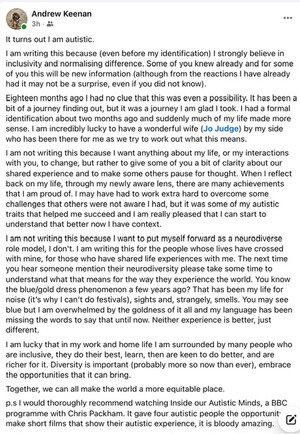- Jun 16, 2020
- 5,882
- 2,786
- 17,935
After 12 years of retirement I still follow some of my ex work colleagues on FB and LinkedIn. I was surprised when one posted this today.
Before I left, he was one of my staff. They needed to find a replacement for me and they could find no one nationally (probably not enough money). I could not recommend anyone who applied internally. This is the only one I could recommend and they had to pursued him to apply. Later, he was promoted even further. Then he moved on to manage an educational museum. I had a lot of respect for him.
This is his Facebook entry.

I had absolutely no idea. But good on him for ‘coming out’. So to speak. I am very proud of him.
John
Before I left, he was one of my staff. They needed to find a replacement for me and they could find no one nationally (probably not enough money). I could not recommend anyone who applied internally. This is the only one I could recommend and they had to pursued him to apply. Later, he was promoted even further. Then he moved on to manage an educational museum. I had a lot of respect for him.
This is his Facebook entry.

I had absolutely no idea. But good on him for ‘coming out’. So to speak. I am very proud of him.
John

